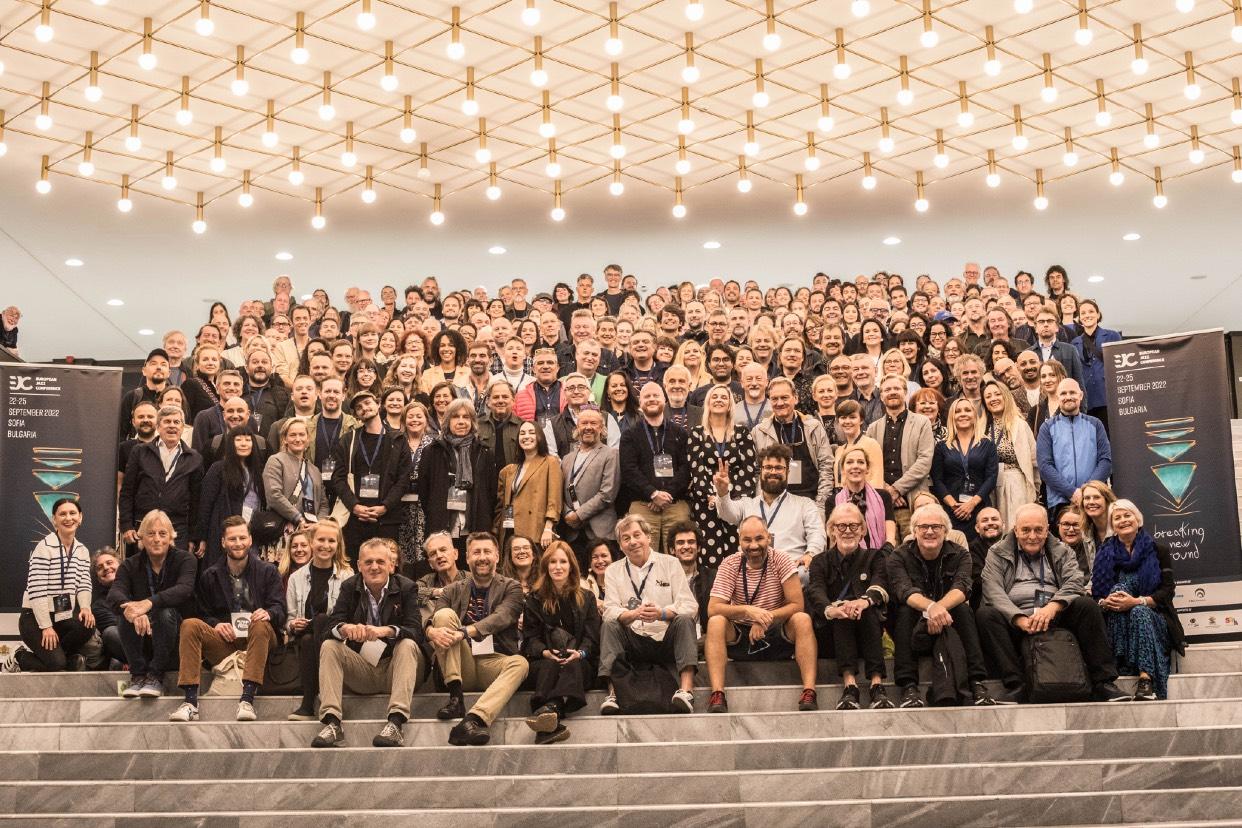
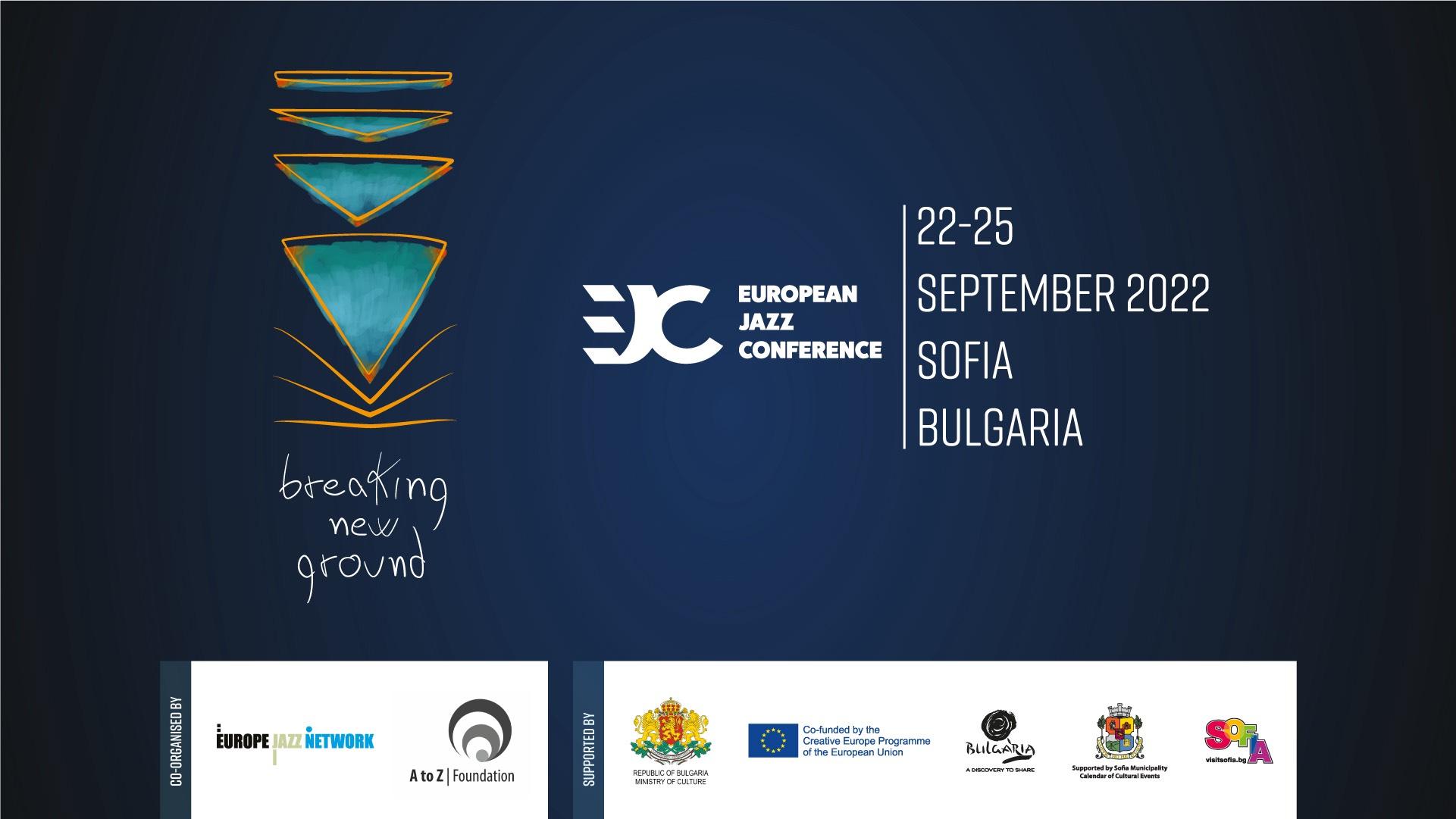
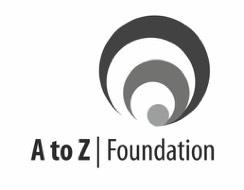
European Jazz Conference 2022
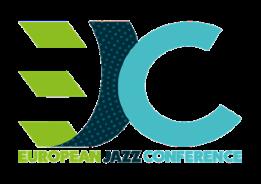
Hosted by A to Z Foundation
Sofia, Bulgaria, 22 - 25 September
Reporter: May Ngo
Photos: © Pavel Koev / A to Z Foundation
Index
INTRODUCTION 3
FRIDAY 23 SEPTEMBER 2022 4
Official opening & welcome speeches 4
Keynote speech: “At Home in Music” by Alicja Gescinska 6
Stand with Ukraine concert: Dennis Adu & Dmytro Avksentiev 8
Five parallel discussion groups on the conference theme 9
- Leadership 9
- Sustainability 10
- Fair Practice Policy 11
- Business Models / Entrepreneurship 12
- Gender Balance 14
SATURDAY 24 SEPTEMBER 2022 17
Panel debate: “Does music make people & society better?” 17
Bulgarian presentation: musicology of the Bulgarian traditions 21
Special tribute to John Cumming, Wrap-up & Presentation of the Conference 2023 24
APPENDIX A: Conference and Showcase schedule 29
APPENDIX B: Participants’ list 33
APPENDIX C: Selected media links 44
2
INTRODUCTION
Breaking New Ground was the title of this 8th European Jazz Conference in Sofia and, judging by the feedback we received through our survey, we can be happy with the steps ahead we took in this direction. Last September, 324 professionals of the music sector from 38 different countries came together in Sofia, for the vast majority visiting Bulgaria for the first time. We discovered there a rich culture and music tradition and some interesting directions for its next developments.
It has also been the Conference with the highest attendance by EJN members. Our network is constantly growing and we are very pleased that the members, old and new, continue to come in very high numbers to our main event of the year, something quite unique in all European cultural networks.
Many insightful debates took place in Sofia, looking at ways to innovate our actions in different fields: sustainability, leadership, gender balance, fair practices, new business models for our venues and festivals. The challenges that are ahead of us are huge, and learning from each other, exchanging ideas and looking for common solutions must be the way forward to address them.
Very special moments in our conference this year have been the concert by two Ukrainian artists, Dennis Adu and Dmytro Avksentiev, the intervention by our member from Belgrade, Dragan Ambrozić to congratulate Mila and Peter, and the tribute to our dear friend and founding member John Cumming. They are all examples of the spirit and the values of our network, that go beyond the conference in all the activities that we carry on during the year.
I would like to thank the EJN staff and all the team of A to Z Foundation for the organisation and support. Thanks as well to the EJN Board of Directors and to the conference Programme Committee for their great job and inspiration.
Finally, I remind you once again, as already announced by Régis Guerbois and Hugues Kieffer during the final plenary session, to save the dates for the 9th European Jazz Conference which will take place in 2023 from September 14 to 17. See you all in Marseille, France, we are sure it will be another memorable experience for all of us!
Giambattista Tofoni EJN General Manager
3
OFFICIAL OPENING & welcome speeches
The National Palace of Culture in Sofia, Bulgaria was the stunning venue for the 8th edition of the annual European Jazz Conference. The largest multifunctional conference centre in Southeastern Europe, this landmark building made of concrete and glass hosted across 4 days over 300 music professionals from more than 38 countries in Europe and beyond. The delegates included festival and venue directors, national and regional organisations, international promoters, booking agents, artists’ managers, academics and journalists.
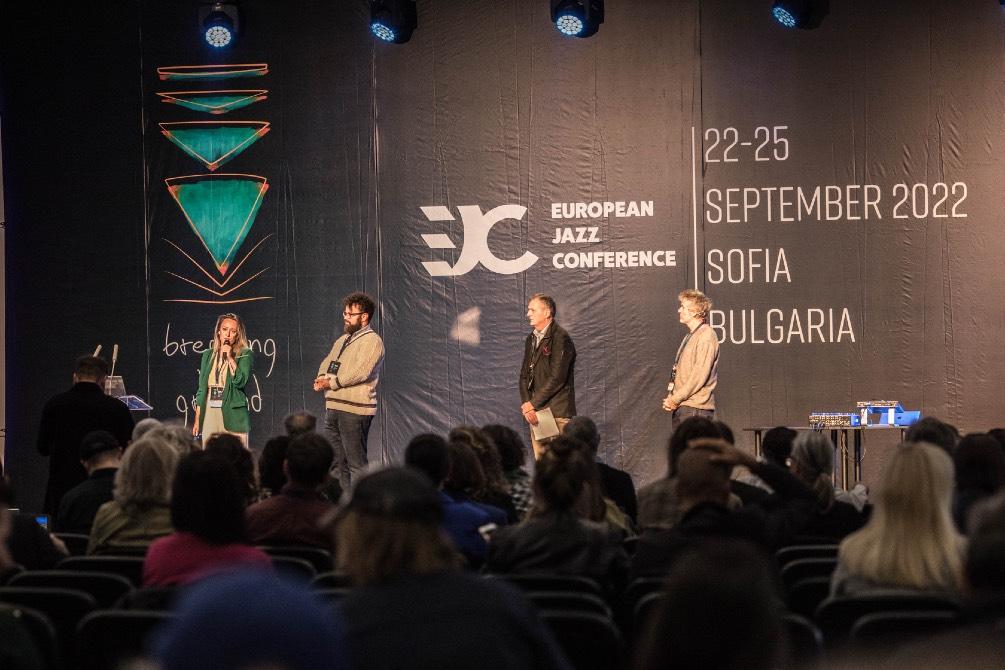
The proceedings started with a warm welcome from the General Manager of the Europe Jazz Network (EJN), Giambattista Tofoni. He explained that this conference in Sofia was actually scheduled to occur in 2020, but due to the pandemic it had to be postponed. Thankfully, the coorganisers, A to Z Foundation, were able to secure funds to organise the conference for this year. Now we are all finally able to be here together in Sofia in what is the conference most attended by EJN members ever.
Giambattista then invited onto the stage the President of the Europe Jazz Network Wim Wabbes to officially open the conference. After welcoming everyone, Wim stated that the theme of this year’s conference—Breaking New Ground—refers to a record by famous 80’s American jazz pianist Mal Waldron, who explored rock and pop songs to find news into jazz. Breaking New Ground can have many different meanings, Wim said. Literally we’re here in this wonderful city, we can discover it, explore its music, the culture, the history and the cuisine. But it can also mean that we go in search for new ways to deal with the challenges that society and in particular, the music sector, faces. Wim highlighted that the conference has organised parallel discussion groups after the keynote to explore some of these issues. The topics include business models/ entrepreneurship, leadership, sustainability and ecology of the music ecosystem, fair practice policy and gender balance. Wim noted that these discussion groups were organised to inspire delegates, to hear about their experiences, to hear their stories and to look for better ways to do
Friday 23 September 2022
4
He then announced that the keynote speaker for the conference is Belgian-Polish philosopher and writer Alicja Gescinska. She will provide us with a platform for discussing how music, people and society can interact and the impact they can have on each other. But Wim also reassured delegates that after working their brains on this topic, they will be provided with good music and good food to renew their energy.
Giambattista then thanked the Bulgarian organisers of the conference Peter Dimitrov and Mila Georgieva from A to Z Foundation for all their hard work, and invited them up onto the stage to say a few words. Mila welcomed everyone and said that organising for this conference actually began four years ago in 2018, and that they are excited to finally have everyone here in Sofia. She noted that it has been four years of struggle, excitement, cancellation and then starting over, but that they finally did it. She highlighted how important it was to have the conference here because it is the first professional music forum that has been hosted in Sofia. Mila hoped that it was only the beginning, especially since for the majority of delegates it was their first time ever in Bulgaria. Peter added that it was a great honour to be the hosts of the conference. He welcomed everyone to beautiful Bulgaria and Sofia, and hoped that everyone will enjoy a city that has a great history and cultural life. He stated that in the next two days the delegates will encounter something new for them, which is Bulgarian music, and he hoped that they will enjoy it. Peter wished everyone a great time and successful conference, and added that this conference could never have happened without the support of the Ministry of Culture, Sofia Municipality and the Ministry of Tourism of Bulgaria.
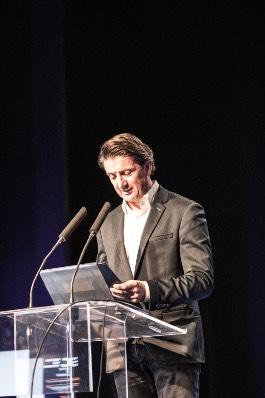
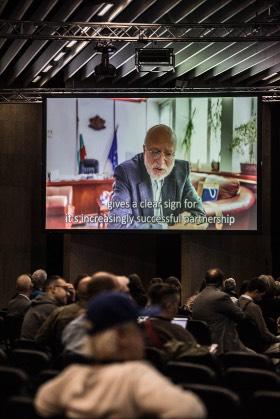
A short video was shown by the Ministry of Culture Prof. Velislav Minekov who unfortunately couldn’t be present, but he sent his greetings and best wishes for the conference, ending the video with a quote by jazz legend Herbie Hancock. The Deputy Mayor of Sofia Miroslav Borshosh was then invited onto the stage to say a few words. He asked everyone to once again, applaud Peter and Mila for their organisation of the conference. He stated emphatically that they, in Sofia, really love jazz. He hoped delegates will leave Sofia with warm memories, not only with what will be achieved during the conference, but also a warm memory of Bulgarian hospitality, and that they get a chance to discover the soul of South Eastern Europe. He stated that the city of Sofia has given increasing support to jazz music during the past 10 years, and will continue to do so because they strongly believe that music is that eternal bridge between humans, and that jazz is the music of free will. He ended his greeting by wishing everyone a beautiful experience in the city, at the conference and in the contacts that are made; and hoped that everyone will remember Sofia as a strong friend of jazz.
Giambattista then thanked the Mayor, Deputy Mayor and the city. He also thanked the European Union for giving the EJN a grant as part of the Creative Europe programme. He then thanked the invaluable work of the EJN staff, Francesca and Stefano, as well as the Board of Directors of the EJN, and the members of the EJN. He noted that without the members of the EJN, there is no network at all. He then invited the MCs for the day to the stage, Maria Rylander (Knutpunkt, SE) & Fernando Sousa (Casa da Musica, PT). They each introduced themselves before welcoming the key note speaker Alicja for her keynote speech.
5
“At Home in Music” by Alicja Gescinska
Polish-born, Belgium-based philosopher and writer Alicja Gescinska began her keynote speech with a question: Does music make humanity and society better? Intuition tells us that ‘yes’, but beyond making our lives nice, does music actually make us morally better? Does it make us better human beings? What motivated her to explore this question was how it seemed irrelevant to philosophers in the past.
When she asked this question to Krzysztof Penderecki, a Polish composer and conductor, his answer was an emphatic ‘no!’ She was very surprised by this, because some of his works addresses world events and social issues, for example: the Polish Requiem (Lacrimosa dedicated for Lech Wałęsa), Threnody for the Victims of Hiroshima (1960) and 1000 Voices for Peace (2014)
Alicja noted that this is an important question for policy makers and the state, because why should they fund music? Why have it in the school curriculum? For example, it is no longer part of education in Belgium anymore, you have to pay for it privately.

Then she outlined the recurrent thinking in philosophy, which is that reason is good and emotions are dangerous. Music plays with our emotions, therefore music can be dangerous; it arouses dangerous passions. Plato (427-347 BC) in The Republic distinguishes music as being able to play a supportive role in the ideal state but that censorship is needed because it awakens irrationality in man as well as powerful emotions. There is can be harmful for the individual and society. Music can be a force for good, but also for bad. And he believed that changes in musical taste and preferences will change society.
Immanuel Kant (1724- 1804) in his Critique of Judgement delineated a hierarchy of the arts, with poetry on top and music at the bottom. This is because for Kant, reason is king. It is what we should be striving for and music is least noble of all the artforms because it arouses emotions. But Kant also admits it is the most enjoyable artform.
Theodor Adorno (1903-1969) of the Frankfurt School was an extreme left-wing philosopher who believed that certain types of music are morally corrupt. He singled out jazz as being particularly corrupting of the soul because it is a product of American capitalism.
George Steiner (1929-2020) stated that ‘humanities don’t humanise.’ Music doesn’t make us better, nor corrupt us. It doesn’t influence us either way ethically or morally. His example it that of Germany, which has beautiful music and a rich cultural heritage but none of that stopped the barbarism of the Nazis, despite the Nazi’s impeccable taste in music and the arts. He believes the Second World War answered that question of morality in music. History in fact is full of examples, Stalin was a fan of music, and conversely, many great musicians weren’t particularly great people
KEYNOTE SPEECH
6
(Horowitz, Wagner, Celibidache). It is an undeniable fact that cultivated minds can still be barbarians.
But do art, literature, knowledge of history and music play no role in our moral development at all? Why then do we have this intuition that music, the arts and humanities, make us better? Influences us? Something is happening, but what?
Alicja then stated her main thesis: that music is an exercise in empathy. The key word is exercise, it is not a guarantee. There is only the possibility that you will get better at it the more you practice. What is empathy? According to the Oxford Dictionary, it is the capacity to be emotionally and cognitively in tune with another person, in other words, the ability to understand what goes on in someone else and to be concerned about what goes on in someone else. Empathy increases our understanding of others, ourselves and our society.
1. Understanding the other
For Roger Scruton, music is a dialogue, a gateway to the first-person perspective of the other. For Martha Nussbaum music opens us up to the perspective of the other. But not only classical music; for example, nursery rhymes as well. Vladimir Jankélévitch (1903-1985), a French philosopher, talked about music as a ‘duet of hearts’, an intimate conversation between you and another.
2. Understanding the I Music is self-discovery, because there is a close link between music and identity. Music is often linked to memories and chapters of our lives, therefore music impacts on how we understand ourselves.
3. Understanding us Music has the capacity to unite people: in a concert hall, an orchestra, a choir. It unites us as well with people long gone. It is fundamental in community building, collective identity, solidarity, for example the National Anthem. Music allows us to connect to another culture, also allows to keep that culture alive in difficult circumstance, for example in the context of Ukraine.
Alicja concludes that Steiner is right, of course, that humanities don’t humanize. But that is only part of the truth. Music can’t stop bombs or the trains to Auschwitz, but neither did maths or engineering. Without music, without art or humanities, barbarism is on its way.
Music doesn’t solve everything, but it opens our heart, disarms our heart – on the condition that you have a heart. In summary, does music make us better? It depends on your heart!

7
STAND WITH UKRAINE
Concert by Dennis Adu & Dmytro Avksentiev
Mariana Bondarenko from the Ukrainian Institute gave an introduction to this musical duo before they performed, explaining that the collaboration between Dennis Adu and Dmytro Avksentiev first began in the Am I Jazz? Festival in 2020, thanks to Olga Bekenstein. During the whole collaboration, they never met each other but only exchanged messages on Telegram. They both worked intuitively and emotionally, and despite their short time collaborating are still to this day working together on upcoming projects.
About the duo: Koloah (Dmytro Avksentiev) is an electronic musician based in Kyiv, now temporarily displaced. For more than a decade, his musical path has taken him through a cross-section of underground, famous clubs and parties such as Closer, Tresor, Berghain, and more. He also produces in different genres and works under aliases such as Tropical Echobird and Voin Oruwu. In 2020, he founded the label Salon Imaginalis, a platform for realising non-genre music.

Dennis Adu was born in 1987 in Saltpond (Ghana). When he was 2 years old, his family moved to Kryvyi Rih, Ukraine. He started playing the trumpet at the age of 7, and when he turned 8 was invited to join the Alexander Gebel Orchestra. Dennis participated in international festivals and competitions like Millau en Jazz (France), Fel du Sher (France), Jazz A Vienne (France), Alfa Jazz Fest (Ukraine) and many others. Since 2012 he has been leading his Quintet, Sextet, Septet and Big Band.

8
FIVE parallel Discussion Groups on the Conference theme
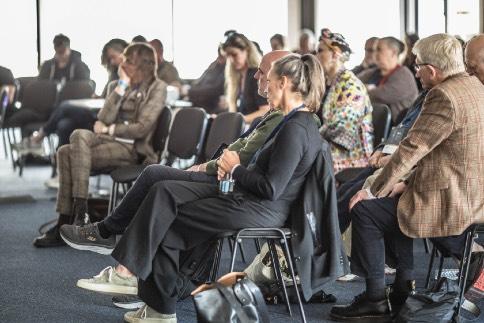
LEADERSHIP-Cultural operators working in jazz & improvised music
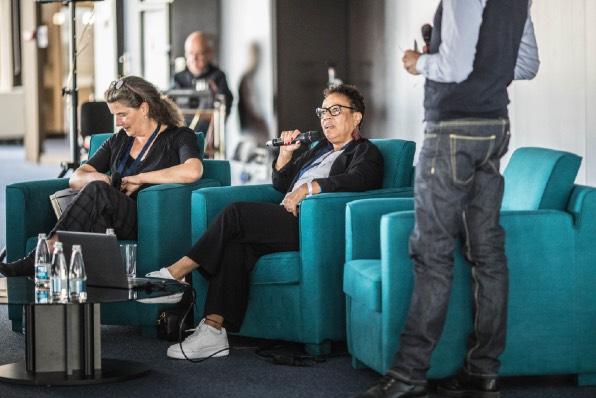
With: Janine Irons (Tomorrow’s Warriors, UK) & Kornelia Vossebein (Stadtgarten, DE)
Moderator: Mark van Schaick (inJazz/Buma Cultuur, NL)
Moderator Mark van Schaick began the discussion by emphasising the importance of leadership and having a clear vision for organisations. Janine Irons from Tomorrow’s Warriors stated that she was never told she was a born leader, in fact the opposite, that she would never amount to much. She feels she had to prove herself whole life, especially as a person of colour. Kornelia Vossebein from Stadtgarten added that leadership should evolve organically, dependent on specific situations and who has the most experience or skills, rather than on hierarchical structures.
The discussion moved on to the question of succession and how to pass on leadership within an organisation. Janine said that she hopes someone will come along who will be ‘the one,’ but she doesn’t really know. In any case, whoever takes over will need to be given the space and permission to find their own vision for the organisation. Kornelia emphasised that it should be an organic process, a result of development over time in getting to know people and the organisation.
Diversity was also discussed, not only in leadership but throughout the wider music industry. Janine said that Tomorrow’s Warriors was created to address a need, that is, the lack of diversity and representation of black talent and women in jazz. Now, over 30 years later they are seeing more black musicians, managers and labels. Things are improving, but there’s still a lot of work to do. Organisations also need to be more proactive in going out to communities to inform them about what they are doing, rather than expecting poor and diverse communities to come to them to access their programs. There is a need to cultivate sustainable long-term relationships with these communities, rather than just a tick the box exercise.
The discussion then moved on to the role of Boards in an organisation. They can provide a different perspective or voice to the leadership team. There were a range of experiences of Boards – some had Boards who were too interfering in the day-to-day operations, while others were very hands off. One person joining can change the whole nature of the Board.
9
There were mixed responses to the question of whether the Board is a good system for running an organisation.
Delegates also discussed the loneliness of being a leader. As a leader you sometimes have to make difficult decisions, especially at a time when funding for arts organisation has become harder. Therefore, developing resilience is important. Having a support network and more learning and development opportunities can help with this. Self-care, taking time away from the work, and having a good work-life balance is also critical. The EJN has been a space for people to share their issues as leaders, a supportive space with others that alleviates some of the loneliness of being a leader.
SUSTAINABILITY & Ecology of the Music Ecosystem
With: Matthew Herbert with a video “provocation” (artist, UK), Karolina Juzwa (International Jazz Platform/Footprints, PL) & Francesca Bertolotti-Bailey (visual arts, art fairs & arts residencies organiser, IT)
Moderator: Margaux Demeersseman (Centre National de la Musique, FR)
Moderator Margaux Demeersseman began the discussion by highlighting that carbon footprint is an important priority, but we need to think of reducing our overall footprint more generally in the music industry, for example the impact on the environment in our merchandising, equipment, buildings and energy consumption. One delegate commented that we treat climate change as a headache, but we should treat it as a heart attack to relay the urgency of the situation, especially as the energy crisis has highlighted the need not to be dependent on energy from undemocratic societies. Another delegate pointed out that this is the right time to implement sustainability measures as the music industry is just coming out of Covid and many things have to be started again.
A video by Matthew Herbert was shown to delegates. In the video, Matthew provided two main provocations for discussion: firstly, the sustainability of infrastructure. He stated that we can no longer tour like we used to and need to understand the carbon footprint of everything we’re doing. Second, the sustainability of the creative ecology of what we do. As making a living from music becomes more unstable, Matthew believes that music has become more conservative and is leaving the status quo untouched. The question we need to ask ourselves is, do our actions both creatively and in terms of carbon footprint, leave the world the same, or have they affected some kind of change, big or small? This is a fundamentally artistic question that is impossible to separate from more structural issues. Matthew ended the video by stating that we need to be more radical than we are.
In the ensuing discussion, some delegates disagreed with Matthew’s focus on individual musicians and the need to decrease touring. Some said that a musician’s footprint is the smallest and least problematic of all in the music ecosystem, and that artists have a powerful platform they can use to spread a message, rather than staying at home. Others argued that this focus on artists rather than infrastructure is typical of a neoliberal rhetoric that ignores the wider

10
system. It is also a very privileged position to be able to give up touring or do slow travel; not many people can make this choice.
Others said that we need to acknowledge that the music ecosystem must adapt itself to climate change, this is simply a fact that cannot be avoided. And although music doesn’t have the biggest ecological footprint, it still has to do its part which doesn’t mean that artists have to take on the biggest load in this. We need to push for change on the systemic level, for example funding for slow travel and for other small changes in working methods. We need to get on board the help of policy-makers and funders.
Other delegates recognised that this is a very emotional and political issue, so it’s important to know the numbers to address the problem correctly. Some projects that are doing this is the Carbon Footprint Assessment by the Jazzé Croisé Association that examined the footprint of nine festivals and venues in France, Netherlands and Norway; the Footprints project in Poland that aimed to combine supporting emerging artists with ecological sustainability; the French National Music Centre’s building of a roadmap for sustainability; and Cove Park’s use of an ecological coordinator as well as funding for slow travel.
Delegates discussed the needed for work to occur on two levels, on the individual level and on a more global level where collaboration is happening with other networks. In this case, there was discussion about initiatives that the EJN has already undertaken, for example ‘Take the Green Train,’ with its Green Manifesto, the EJN Green Pilot Tours! as well as other initiatives coming up next year including web-tools on how to calculate the impact of venues. An idea was raised to collect via email all the European resources available and to share them between members. One delegate asked whether the EJN can organise a space online where we can share best practices. A staff member said there are a few resources already on the EJN website that members can look up.
Fair Practice Policy
With: Jan Pauly (VI.BE, BE)
Moderator: Davide Grosso (International Music Council, IT)
Moderator Davide Grosso (International Music Council) began the discussion by giving an overview of the most important international legal frameworks related to artistic fair practice such as the Recommendation on the Status of the Artist (UNESCO, 1980), the Convention on the protection and promotion of the diversity of cultural expressions (UNESCO, 2005) and the more recent European Parliament resolution of October 2021 on the situation of artists and cultural recovery in the EU.
Following on from this, Jan Pauly from VI.BE, Belgium, presented the Juist is Juist campaign (What’s Right is Right), a national initiative defining clear principles and fair practices for collaboration in the arts sector, across all disciplines. Juist is Juist consists of a toolbox of 4

11
principles and 12 agreements that will enable cultural professionals to enter into partnerships on an equal basis. It is a living document that takes into consideration that fair practices can differ depending on the context – but without calling into question basic legal and solidarity principles. The aim of these tools is to make negotiations more transparent and to facilitate artistic collaboration so that they occur in a more informed and fair manner.
In the discussion, many delegates highlighted the way that an already fragile situation was exacerbated by the global Covid outbreak. Examples from France, Austria and Greece showed on the one hand that there are huge differences between EU countries, but at the same time there was also common ground. In particular, practices that were not done before Covid, such as a venue cancelling a show only because of low ticket sales, has become the new normal. Another issue was the increasing number of administrative and fi nancial obstacles to organise a tour in good conditions.
All participants highlighted the need to have clear rules and constant dialogue, in addition to the wish of having an EU standard on fair practice. A proposal about an internal EJN charter was put on the table and raised some challenges:

• Identifying the partners beyond the EJN network
• Not being exclusive
• Have the broadest process possible
• Consider the time needed
• Consider the costs of the process
• Mechanism to evaluate regularly
The idea of an internal survey was raised in order to collect ideas, challenges, good practices and trends from EJN members. From a procedural point of view, it was pointed out that similar initiatives have been already implemented within the EJN (i.e. Manifesto on Gender Balance) with the Board coordinating the process, along with the staff and the General Assembly adopting the outcomes.
Business Models / Entrepreneurship
With: Daniela Neumayer (Saalfelden International Jazz Festival, AT) & Murat Sezgi (Bozcaada Jazz Festival, TR)
Moderator: Virgo Sillamaa (European Music Exporters Exchange, EE)
Moderator Virgo firstly clarified both terms in order be clear about the framework in which this discussion will take place. Business models and entrepreneurship are both often thought about in terms of profit-making only which he believes is erroneous. Instead, business models are about seeking a balance between what is coming in and what is going out so that an organisation can achieve its goals. Entrepreneurship is about people taking various kinds of risk to create and lead change. Virgo also wanted to highlight the bigger context in which business models and entrepreneurship occurs, what he terms the ‘Mega Trends.’ These include environmental crisis; digitalisation and tech-driven change; geo-political, economic and social instability; and pandemic(s).
12
In the discussion, delegates highlighted a range of different business models. For example, the Saalfelden International Jazz Festival work closely with the Tourist Office where the festival is part of the attraction for tourism. Reliance on the tourism industry means being less dependent on changing cultural policies. Delegates also discussed gaining sponsorship from different industries, and the importance of involving sponsors as much as possible so that they feel a sense of ownership. Beyond sponsorship for money, involving different groups in a festival (for example podcasters, yoga, blockchain) who don’t bring monetary value, but do bring their own connections, resources and audiences can be bene cial. Bozcaada Festival in Turkey has a ‘vibe manager’ who ensures that the festival as a whole is a good experience for everyone. Jazz should be seen as something cool that everyone wants to get involved in, rather than something to be merely supported.
The discussion then turned towards challenges including an ageing audience and how to get new audiences into concerts. Someone noted that it is not necessarily the audience but the problem of promoters getting stuck in their ways and doing the same thing. The need to bring younger people into an organisation, who know how and where to communicate to other young people. There has also been a loss of talent in the industry due to the pandemic, many did not return because they did not want to stay in a vulnerable, unstable industry like the culture sector. There is also a need for more data on audiences to better understand them. Although you can already start with data from online ticket sales and social media, it would be good to be able to get more data. Can EJN possibly help in doing this? For example, the creation of a ‘Europe Live Jazz Card’ app, where every time people use it to pay for something, they get bonus points or promotions from EJN members. The data is then collected in a more centralised manner.
EJN could also help by inviting a sponsor to talk to EJN members. We are always trying to imagine what sponsors are thinking, trying to anticipate their needs and wishes, so why not get direct inputs from them? Delegates also talked about how working with the Tourist Office is an example of a good business model and could be transferrable. A Tourist Office representative could be invited to come to the next EJN conference to talk with network members.

13
Gender Balance, different situations in the former east & west of Europe
With: Aneta Norek (Film and Jazz Music Foundation, PL) & Agnete Seerup (JazzDanmark, DK)
Moderator: Maria Pia de Vito (artist and artistic director, IT)
This panel was moderated by Maria Pia de Vito, artist and artistic director from Italy. It was initially supposed to focus on the differences in gender balance between Eastern and Western Europe, but since Bulgarian speaker Mihaela Georgieva was ill, presentations were instead made by EJN members from Poland and Denmark.
The first speaker was Aneta Norek from the Film and Jazz Music Foundation in Krakow, Poland, who organise the International Contest of Young Jazz Ensembles Jazz Juniors. Founded in 1976, the competition has always been strongly entwined with the history of Polish jazz, since it is at the Jazz Juniors where some of the most famous Polish artists jazz artists made their first steps.
Jazz Juniors includes both a competition and workshops. Aneta said that interestingly, most of the participants for the workshops are girls. But in the competition, most are boys. Aneta said that the feedback she got from girls in the workshops was that they were too shy to enter the competition, they felt that they were not good enough etc. Even the girls who do enter the competition, you could hear this doubt. However, there was no such doubt from the boys. the Jazz Juniors is international, so Aneta believes it not only a Polish issue. In the 46 years history of the competition, only 2 girls have ever won.
Aneta said that this is specifically an issue in jazz - she has a classical music background and found that it was never a problem for her as a woman playing classical music. Aneta only began to doubt herself when she started playing jazz because due to its improvisational nature, a certain level of confidence and openness is required in jazz. Aneta added that jazz education exists in Poland, for example there are 8 jazz departments in different musical academies, but the majority of these students are boys.
The question came up about role models: would having successful female jazz musicians help girls have more confidence? Francesca, a staff member of the EJN said that currently the EJN is implementing a new project with Brussels-based Association Européenne des Conservatoires, to publish online profiles of successful women in music — not only musicians but also backstage crew, leaders, production, admin etc. They also plan to organise webinars and mentoring sessions for students from the conservatoires.
Then Agnete Seerup from JazzDanmark in Denmark gave a presentation. JazzDanmark supports and promotes Danish jazz, both within Denmark and abroad through the creation and development of new collaborations, partnerships, projects, and experiences and by encouraging


14
participation and awareness. Their social inclusion projects are EU funded: improvisation for asylum kids, jazz camp for girls, musikdata.dk
Agnete then went on to present the report JazzDanmark commissioned around the question: Why are women grossly underrepresented in the music industry? 6,000 musicians and composers filled in a survey, 1,500 wrote about their individual stories, 17 interviews were conducted across the music industry, and a comprehensive literary study on the subject was done; in order to study the consequence of gender for performing musicians and composers.
The main conclusions of the report included:
Unregulated working conditions are very hard specifically for women
The use of private networks are intertwined with professional networks. This seems crucial to obtain a career — yet women experience being excluded from these private networks. Furthermore, insufficient labour rights hit women harder i.e. in relation to maternity leave, sick leave, retirement etc. Lastly, women experience prejudices related to the idea that “working with female artists makes it harder to earn money” i.e. that they are not as financially lucrative as men
Prejudice overshadows the recognition of women and non-cisgendered
There are stereotypical notions and biases about what women need to be able to succeed, negatively affecting the assessment of their musical abilities. More than one in three women and almost half of the non-gendered stated that they found their gender and appearance have a high or very high degree of significance for the assessment of their abilities.
Boundary violations / crossings are ubiquitous for women and non-gendered
Within the last five years, 70% the non-cisgendered, 64% of women and 44% of men in the study experienced one or more forms of intimidating behaviour in their work as composers and performers. Furthermore, 16% of women reported being paid less compared to 8% of men. What to do about all this? Agnete stated that we need to focus on actions. We have enough knowledge, enough dialogue and enough good intentions. Now we need concrete actions, such as unconscious bias training.
“If you have a brain, you have unconscious bias.” JazzDanmark provides resources, courses and training to organisations on understanding what is unconscious bias and acting di ff erently. The training aims at addressing our unconscious biases and working to improve inclusion and balance in art and culture.

Use of a blind hiring process is also an action that can be taken, to encourage the hiring of people from a more diverse range of backgrounds and to undermine the unconscious bias we all have. Removing personal information from candidate applications during the assessment process and asking only relevant questions is key!
Jazz Danmark also organise a Jazz Camp for Girls. 10 camps per year in summer since 2014, in collaboration with music schools. These camps also occur in Sweden, Finland and Poland.
15
Improvisation is a fundamental part of the Jazz Camp for Girls; it is instrumental to building their confidence, because confidence is key to improvisation. Improvisation also helps group flow and collaboration, where they can learn together, but also goes against the idea that there is a ‘right’ or ‘wrong’ way. This increases the girls’ tolerance of uncertainty and empowers them to make their own music regardless of experience.
Agnete mentioned Charles Limb, a surgeon, professor and music aficionado, who showed that during improvisation, the parts of the brain associated with self-expression are highly active, whereas parts involved with self-monitoring quiet down, enabling a dampening of inhibitions and better access to creativity. Having a Jazz Camp for Girls also raises awareness about gender balance in the music industry.
Group discussion reflected on how the professionalisation of jazz in conservatoires helped girls, allowed them to study jazz. Moderator Maria talked about how her father in Italy felt better that this was something she was studying in conservatoires, giving it legitimacy, rather than just in clubs or venues. The institutionalisation of jazz has made it more accessible to girls, but they need more living role models, who can also be their peers, as well as revising the history of jazz. The group discussed the fact that the history of jazz is not neutral, based as it is on a European history of music where women are hidden or not mentioned.
The group concluded that change is happening but very slowly. We need structures to change, to be stronger, so that jazz is attractive to girls and women. But it also reflects a deeper societal problem: the jazz industry will change only when our society changes.
The group suggested that JazzDanmark organise unconscious bias training for EJN members, especially training on how to apply it to each member’s organisation. They could also conduct a workshop at next year’s conference.

16
PANEL DEBATE
music make people & society better?”
With: Alicja Gescinska (philosopher & writer, PL/BE), Petter Frost Fadnes (artist & researcher, NO) & Maria Pia de Vito (artist & artistic director, IT)
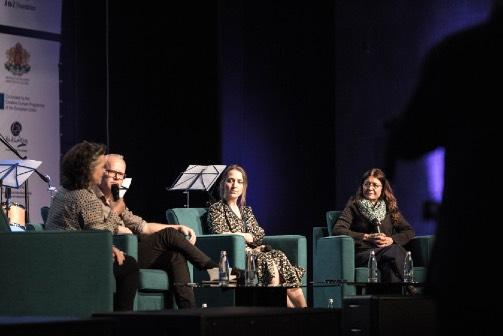
Moderator: Susanna von Canon (artists’ management, NL)
Moderator Susanna introduced the topic ‘Does music make people & society better?’ She acknowledged that this is a topic we could devote a whole conference to because of how complex the question is. She referred to the related keynote speech by Alicja yesterday, saying that personally for herself, music makes her life better, has given her a livelihood, and has made her very happy. But does it make society better?
Petter responded first, saying the idea that drives him is that if everyone engaged in improvisation/jazz, the world would be a better place. When he first started playing jazz, improvisation spoke to him because there was a notion of freedom in it and of self-expression. As a researcher, he got interested in the idea of improvisation as a life skill, and the ecology of music around it: the local culture, venues, bands, the impact and connections between them. He prefers to use the word ‘musicking’ as a verb, music as a thing you do but you don’t do it on your own, it’s as a social thing. Improvisation highlights this, because improvisation doesn’t work in isolation, it’s about connection not only between musicians but also between the audience and the stage.
Maria agreed, she felt that music, in particular jazz and improvisation, has helped her so much to open up. It helped her to overcome a lot personal problems and gave her a better perception of herself, because in improvisation, there is no right or wrong: it’s a dialogue. It’s a jumping into the void, but there’s a safety net in that it is a dialogue with your peers. It’s the best contribution she’s done as a teacher, teaching this. She has also seen in four decades of teaching the environment around this becoming better especially for women.
Susanna added that that’s why we need to get music education back into schools. She then asked Alicja how she sees it from her perspective as a philosopher. Does she go to concerts?
Alicja responded with, yes of course she does, it’s part of her identity. Alicja added that we can feel connected to music, and feel understood, no matter where that music is from. It builds a bridge over time and space; we feel so close to the music that moves us. We feel more offended by someone’s music choice than food, for example, because of how personal music is. There is a healing aspect of music, people say that music helps in making life more bearable and helping people to communicate; music is already used in a therapeutic context. It’s undeniable that music
Saturday 24 September 2022
“Does
17
is very powerful. But exactly because of this, music can also affect people in a negative way, it can do harm as well as heal and build communities. Music is also used to hurt people and destroy things, it has been used as a weapon of terror.
Petter talked about his project with Roma people. It is a collaboration that has been happening for years now between Roma musicians from Slovakia and Norwegian musicians, where they aim to merge free-form improvised music with beautiful songs from Eastern Slovakia. The musicians spent 20 days together in total over a year listening to each other’s songs, resulting in an album and a tour. The basis of the project was listening: to listen to each other. It broke down language barriers—there are four languages within the group— because they focused on the common language of music. An orchestra was created and they are still working together.
A question was then posed by the moderator Susanna – with the situation in Europe with refugees and other people in difficult situations, there’s many who want to use music as a way to bring people together especially because it can cross language and cultural barriers. But are we going in the right direction in terms of music projects, for example, do they even want to participate in these projects by ‘do-gooders.’ Are we missing the mark, do people really want to be making music in this context? We feel good doing good, but is this what is needed?
Maria responded by saying that it’s a never-ending effort, but that it’s worth doing it. She is from Naples, where there is a huge musical heritage that is a continuous blending of different musical cultures. In Italy, there is currently a big debate in the country about the right to become an Italian citizen after a number of years. They have elections tomorrow and it’s terrible, because they are in danger of going backwards. But in Naples, she has seen bands with people coming from all over, she participated in a short documentary with the exact aim of showing how integration is important; it featured herself and an Indonesia and Senegalese woman all singing Neapolitan songs with improvisation in it. A lot of these things are happening, and at least that have a local impact, in the hope that added together all of these things will have a national impact politically.
Susanna mentioned two right-wing politicians who are also brilliant piano players. How is that possible? Music is supposed to bring us together, supposed to make us happy. Alicja said that we are often confused about the word ‘happiness’. Happiness is not something good in itself. Of course, we want to be happy, but your own happiness is not necessarily a good thing for others per se, for example, some people are happy that foreigners are not allowed in the country, but it
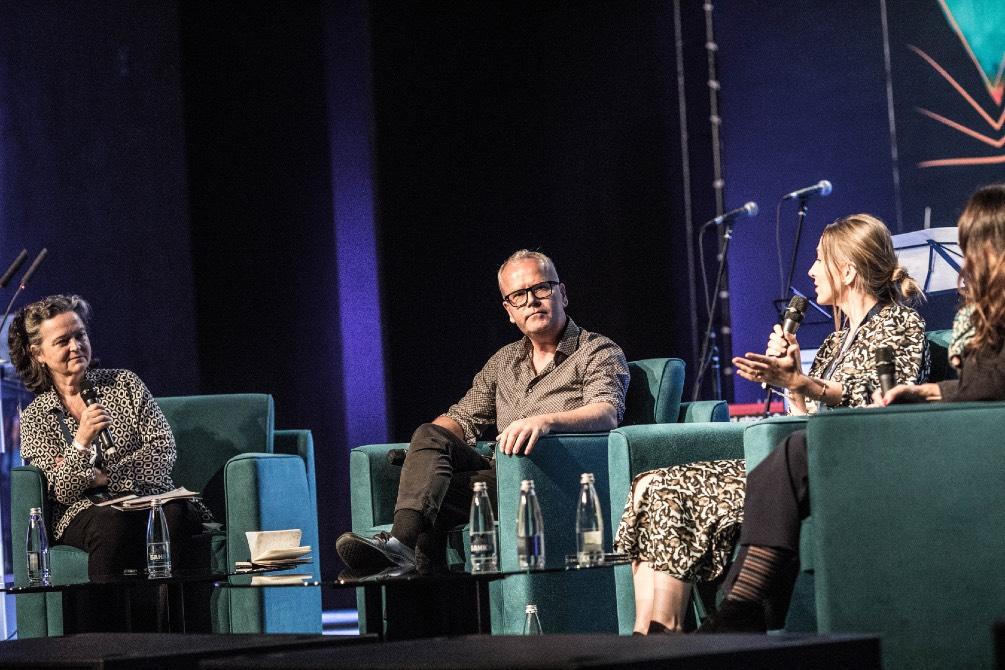
18
should not be the goal for society because it’s not a moral position in itself, achieving happiness. It’s OK to use music as a tool, instrumentalising it. But be realistic, it’s just a tool. You can try but not guarantee the outcome. Human beings are complex and not everyone will respond to music or be healed by it. We put too much pressure on music, Alicja said, we need to be modest about the power of music.
Maria added that art can be disturbing, in fact it has to be. It can be disturbing, sincere and posing questions so not necessarily making everyone happy; but it is moving something, creating questions, creating doubts.
Petter mentioned as an example, “We are the world” song by celebrities and pop stars in the 80’s. That’s not it. That’s not the power of music in terms of doing something. In a cultural democracy, it’s about engagement, not just passively consuming music. In a dwindling democracy and rightwing xenophobia on the rise, there is something in the way that we do music that can be quite powerful. But we need an engagement with local communities, to bring awareness to them, to turn them into cultural citizens. Music can play an important role in this.
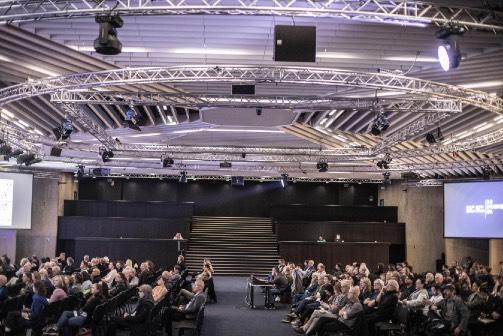
It’s also important to get them while they’re young so that there is longevity, so that we have musician and audiences in 40 years. This is important for the music industry too. We have an ethical responsibility, if schools and the state are not stepping up, that we should. Because improvisation really teaches you skills for life. There are elements of improvisation like play and presence that speaks to children. Susanna adds that it also teaches us how to deal with changes in life. Petter agreed, improvisation literally changes our brain. Music should be part of a health recommendation, like eating a healthy diet and exercising. Susanna said that there has been studies that show music lifts the pain threshold, and how important it for our physical well-being. But it does it make us better people and society better?
Maria mentioned that in Italy there is now a ‘Jazz goes to school’ program, involving young kids making orchestras and groups to improvise together. The aim is that they will feel more accustomed to being in dialogue with others and feel like they have equal rights to speak up. Susanna added that as performers and facilitators we should think about expanding access to music to people who don’t have easy access to it. It will at least make their individual lives better, even if it’s not society as a whole.
Petter said that it’s also important not to glorify that music is all about togetherness, that we are always in harmony and holding hands. There are tensions when playing music, but that’s also part of life skills. Tension can be at the core of music, and
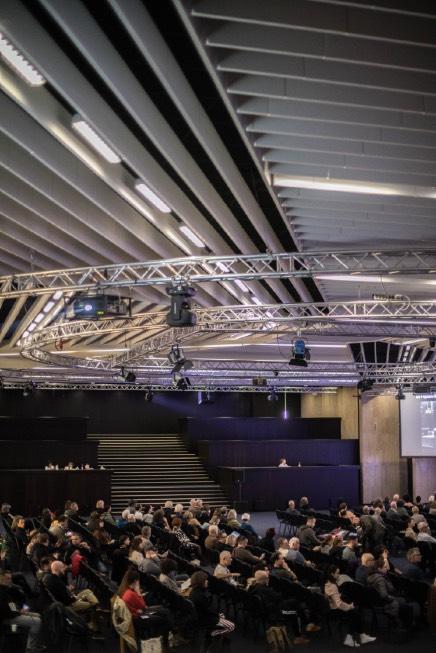
19
improvisation is also about learning how to be in opposition to another instead of being violent. The roots of jazz are in slavery, from an underground subculture who was in opposition to the status quo, who were using music to survive.
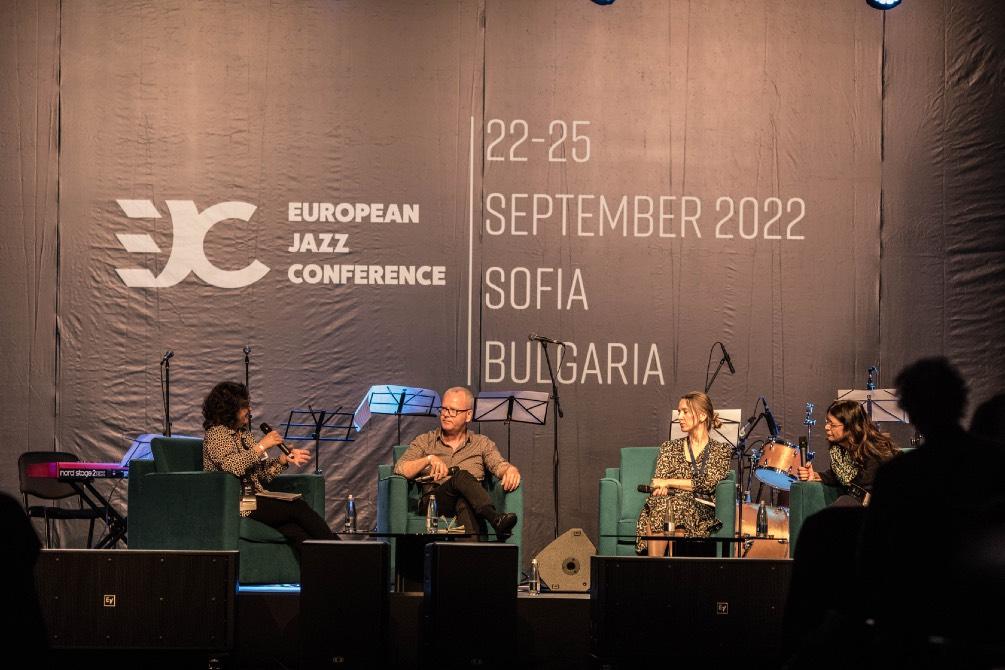
But Susanna asked, to go back to the question of the theme, does music make us better people? Does music improve the functionality of people?
Alicja replied that we cannot answer with a no or yes, full stop. It always depends on the context. It depends on what are the other conditions affecting things, under what conditions does it improve life? But we always have to keep in mind that if it can be used to heal, to promote democratic feelings, it can also be abused for other things, you can corrupt a soul, you can really divide a nation with music, for propaganda for example. It’s a powerful thing and we shouldn’t romanticise it too much.
So how should we use music as a positive force to improve society?
Maria said that jazz is so many things nowadays, connected to research, to entertainment, connecting cultures, connecting languages. She said that to end with something positive, in forty years she’s seen a great evolution in the attitudes towards women in music. Petter responded that we need to emphasise engaging in local culture, creating a sense of identity. It depends on how you use music – whether as a way to open to the other, or as a wall.
20
Musicology of the Bulgarian Traditions, with Borislav Petrov
Ethnomusicology student and artist Borislav Petrov gave a presentation on Jazz, Folklore and Folk Jazz in Bulgaria. He began with an interesting fact – that the Wallace Hartley Band who played on the Titanic, had also played in Sofia.
Then he talked about the different ways that jazz was introduced and spread into Bulgaria. Jazz music began to appear in Bulgaria right after World War I from military bands from the Allies, especially in Sofia. Bulgarian musicians picked it up very quickly and began forming new bands, performing at theatres and casinos. The Charleston dance also became very popular in Bulgaria. Jazz also came to Bulgaria through silent movies, in cinemas there were bands who played music to the silent movies, including jazz. Gramophones also helped to spread jazz: in 1919, there were only 100 gramophones in Bulgaria. Two years later, there were 16.763 gramophones bought. Jazz became particularly popular amongst Bulgarian intellectuals. For example, the famous poet and writer Geo Milev spoke about jazz in Bulgaria as early as 1922.
The opening of the American College in Sofia in 1926 also had a huge impact on the jazz scene. A lot of the alumni became the first generation of jazz musicians in Bulgaria. But what clearly marked the beginning of jazz life in the country was the concert of Sam Wooding and the Chocolate Kiddies in Sofia in 1928. This was the first U.S jazz performer in Sofia and will remain the only one for the next 50 years.

The Great Depression in the early 30’s also affected Bulgaria, meaning that a lot of nightclubs and theatres closed down, and musicians lost their jobs. Consequently, many Bulgarian musicians migrated to Berlin, forming a big colony of Bulgarian musicians there. Musicians such as Lubo D’Orio became quite popular along with his big band in Berlin, all throughout the Second World War. Another Bulgarian musician based in Berlin was Ari Leshnikov, who created the first ‘boy band’ the Comedian Harmonists, they became world famous, playing for President Roosevelt. Also in Berlin, Pancho Vladigerov wrote the first jazz originals by a Bulgarian in 1920. There were 20 big bands in the 1930s, with the most most wellknown being Assen Ovcharov’s Jazz Ovcharov Big Band. The first Bulgarian jazz diva was Lea Ivanova.
Jazz live music was really flourishing until 1947, when the Communist regime who had been in power since 1944, decided to change the cultural climate in Bulgaria and address what they saw as a negative American/Western influence in the country. There were restrictions and bans on bands playing jazz. Despite this, all through the 50’s, bands found a way to sneak jazz into their
BULGARIAN
PRESENTATION
21
music. An example was the Balkantourist band. The Balkantourist was actually a big company whose role was to promote Bulgarian culture, especially to tourists. They are also famous for inventing the Shopska salad, created to look like the same colours of the Bulgarian flag: white, red and green.
The second generation of musicians who became the first ambassadors of folklore music outside of Bulgaria included pianist Milcho Leviev, student of Pancho Vladigerov. As the Communist regime became slightly more liberal in the 60’s, he wanted to play more jazz. He collaborated with Symeon Shterev and they created the successful band Jazz Focus 65 which won several European Jazz awards and performed at the Montreux Jazz Festival. The flutist of the band Symeon Shterev appeared in Downbeat magazine. The band was able to go around the regime’s restrictions and played both in Bulgaria and outside of it. In 1978, the second U.S orchestra came to Bulgaria to perform in Sofia, the Glenn Miller Foundation.
The first band to include folklore influences in their music in Bulgaria was White, Red and Green. Pianist and composer Anthony Donchev and others were amongst the first jazz musicians in Bulgaria to start exploring folklore music and to establish the jazz folklore movement in the country.
Borislav then explained a little more about Bulgarian folklore, how it developed and how it became incorporated into jazz folklore. The kaval is a Bulgarian flute that possibly came via the Ottoman empire, used to accompany different rituals and celebrations like weddings. Bulgarian music had traces of some music from Turkey but the Communist regime tried to deny this influence. However, the influences are undeniable.
At the end of the 19th Century, Bulgarian music became influenced by Western music through the arrival of military bands. For example, Diko Iliev, brass band leader and composer, wrote music that was a fusion between Bulgarian folk music, Western music and brass band music. All Bulgarians still dance to one of his compositions on New Year’s Eve, the ‘Danube Horo.’
There are 7 folkoric regions in Bulgaria and they sound very different from each other. A big contribution to the spread of Bulgarian folklore music in the cities were the field recordings that were organised at the beginning of the 20th century and especially in the 1950s, collected by musicologists and written down in books. These written materials and field recordings inspired some classical composers to create works that incorporated Bulgarian folkore, for example Pancho Vladigerov, Marin Goleminov and many more. The Bistritsa Four was a band with folklore instruments that became famous all over the world. But also, many modern instruments were being used that changed the sound.
The Communist regime promoted and invested in folklore as a high art. They began to establish folk ensembles that mimicked classical orchestras, but with folk instruments. They hired composers to write new music and with dancers. There were 9 ensembles supported by the government that existed at the time. One of these, the Filip Kurev National Folklore Ensemble included a full folkloric orchestra, choir and dancers, and still exists today. 2 folklore music schools were also opened in late 60’s. This created a whole level of professional folklore musicians, which is quite unique in Europe. The Bulgarian State Radio & Television Female Vocal

22
Choir, was discovered by Swiss producer Marcel Cellier and renamed the Mystery of Bulgarian Voices. He made them world-famous, and they toured the U.S.
In the 1970s and 80s saw the prominence of ‘Wedding Bands’. They were named as such because most of their performances were mainly at weddings. They took folk music and made it more complicated by introducing solo improvisations and writing sophisticated arrangements. The most famous of this is Ivo Papasov (Ibriyam Hapazov). He is of Turkish speaking Roma descent. Wedding band music became so popular that the Communist government began to see a threat in them. They felt there was a subculture forming that they could not control, so in an attempt to control it, in the mid-80’s they established the National Wedding Band Contest in Stambolovo. After the contest, bands were interrogated by an institution called the Directory of Music which most probably had representatives from the Bulgarian version of the KGB, the State Security. Bands were told not to play elements of Turkish and Roma music, even though many of these musicians were of this descent. There was a general suppression of Turkish and Roma minorities during Communist regime. Despite this, Ivo Papasov’s Trakiya Orchestra became very popular.
Bulgarian folk music includes asymmetric meters that correspond to dance steps. Composer Bela Bartok composed ‘Six Dances In Bulgarian Rhythm’ and made people in the wider musicology world aware of this rhythm. These rhythmic structures are actually present in many folk music in the Balkans, North Africa, Middle East.
Borislav then rounded off his presentation with a brief overview of the emergence of Pop-Folk (Chalga) in the 1990s including Chalga music star Galena, the folk revival in the 2000s, and contemporary gypsy music orchestras.

23
Special tribute to John Cumming,
Wrap-up & presentation of the European Jazz Conference 2023
 Special tribute to John Cumming (1948 – 2020)
Special tribute to John Cumming (1948 – 2020)
Wim Wabbes started the special tribute with a reminder that this network was founded in 1987, which means that the founding members go back a long time; some are still active in the network, some have retired. Some have also sadly left us. John Cumming was one of the founding members of the network who passed away 2 years ago.
For those who know John, you will remember him as someone who was very generous, as someone eager to share his knowledge and experience; it’s actually hard to meet someone who was more dedicated and more engaged, especially towards musicians, but also towards every member of this network. He was also a great storyteller – John had a story about every musician he met.
Giambattista was also one of the founding fathers of the network and has known John since the beginning. Before noting that he could tell us thousands of stories about John, Giambattista went on to highlight that John created the creative sector in Europe, in the beginning of the 80’s there were only the tiny clubs that didn’t have the recognition of an institution. John really changed the life of a generation of cultural operators and artists, as well as audiences. Giambattista shared a memory of the fi rst time they met, and how they decided immediately to collaborate together. He also remembered some of the early concerts they organised with Andy Sheppard, John Surman and Jack DeJohnette. Giambattista said that John was a part of his life for 35 years, and that he really misses him. The last time he saw John in London, they talked about haggis. He had dinner at John’s house and Ginnie cooked haggis with Scotch whisky. It was a memorable night, so Giambattista would like to remember John with a glass of something, smiling, and telling the best story that you could ever hear.
Giambattista then invited Ginnie and Kate, John’s wife and daughter, onto the stage.
FINAL PLENARY
24
Ginnie thanked Wim and Giambattista, and said that she remembered when EJN conferences were small enough that you could just get everyone into a restaurant. Ginnie said that she and Kate wanted to thank everyone so much for inviting them here and for doing this special tribute for John. She feels that she represents John for all the people that he loved, all his colleagues and friends in the EJN, and he would have a message for everyone now: Good luck for the future, and do whatever you can. Just break boundaries. Start all over again if you have to. John just loved the future of the music as well as the present of the music and he thanks you very much from the bottom of his heart.
Giambattista thanked Ginnie for her words, and then talked about the memorial concert that happened at the Barbican, one of John’s favourite venues where he started the famous Jazz at the Barbican concert series. The memorial concert featured an eclectic selection of artists, all of whom have worked with John before, to celebrate his life and musical passions. Giambattista then introduced a video with messages from people such as Alice Russell, Jules Buckley, Carla Bley, Robert Glasper and Joe Lovano, recounting their best memories of John and what he meant to them. Jack DeJohnette ended the video by playing a short piece on the drums for John.
Giambattista then invited onto the stage EJN honorary member Ros Rigby and Nadin Deventer from JazzFest Berlin.

Nadin remembered her first encounter with John. She was a newcomer to the jazz scene in 2008, pregnant, and not knowing anybody. She felt like she had no big company or festival, only ideas and it took all her courage to approach this big name, this giant in the jazz world, John Cumming. He welcomed her with open arms, introducing her to people, to artists, and staying in contact. She talked about her moments collaborating with John, and his incredible knowledge that he always shared. He was also very supportive of women, female artists but also female cultural operators especially back in the early years when there was less of them. John became a mentor for her, and she remembers how generous, how full of joy, energy and passionate dedication he had for music. She is deeply grateful to him and wants to say that on behalf of her generation, the next generation, that he was a source of deep inspiration.
Ros Rigby first met John and Ginnie when they were students at Edinburgh University. Her first memory of John was up a ladder because he was doing the lighting. His background is in theatre, which is why he

25
understood every technical aspect of making a great show. John was also a writer, he wrote ‘Jelly Roll Soul’ about Jelly Roll Morton. He was a very creative individual. They remained friends after university, and in the 80’s began working together in various capacities, but it was when Ros started working at the Sage Gateshead that they collaborated together in a major way, as coprogrammers for the first Gateshead International Jazz Festival in 2005. They would continue on for 14 editions, with their last one together in 2018. She is incredibly sad that John wasn’t able to continue all the musical plans he had. She worked out that it’s over 50 years since she’s known him. He was a great friend and she misses him so much.
Ginnie ended the memorial by talking about how John’s vision was pretty wide because it was international – he didn’t see any boundaries, he didn’t make boundaries. He was a music theatre man, but he was also interested in fine arts, architecture, politics. You have to have that sort of vision or mentality in jazz. John was a real European at heart, it enriched his life to be part of the EJN, it enriched her life. He was passionate about bringing people together, from everywhere.
Ginnie and Kate were then presented with gifts from the EJN, and it was announced that in honour of John’s memory, the EJN would like to posthumously grant him honorary membership so that he can be with us forever.
May Ngo noted that the theme of ‘Breaking New Ground’ was explored in the discussion groups in the conferencewhether the diversity and inclusiveness of jazz was also reflected in the industry and its structures, especially in the areas of leadership, gender balance and sustainability. She also noted that the key note speech of the conference, about whether music makes us better as people and as a society, is a relevant question that everyone here has had to grapple with, either for a funding application or just as an existential question in itself.

Whether music make us better people or not, she found that the EJN is an example of one thing that music does do, which is bring people together. In her conversations with delegates, the word that came up at the conference again and again was ‘community.’ The EJN is a community that has been built across decades over a shared passion, such that people feel like a family coming together each time they meet, while at the same time enlarging that family with new members. Such is the power of music and of jazz: that it is able to connect people and create community in this way.
Presentation from EJC 2023 hosts Marseille has been chosen to host next year’s conference in 2023. Régis Guerbois, President of Marseille Jazz des Cinq Continents in France came onto the stage, thanking the President and the Board for choosing Marseilles, and stating how happy and proud they are to be chosen. He then gave the conference an introduction to this wonderful city in the South of France. Marseille is full of stories and has an extraordinary heritage; with its 2600 years of existence, it is the oldest French city with notable monuments such as the Notre-Dame de la Garde, the Old Port and the
WRAP UP by May Ngo, independent writer from Australia based in the Czech Republic
26
Palais Longchamp. It also has the Stade Velodrome, home to the city’s football club Olympique de Marseille. Marseille is also known for its soap, the famous savon de Marseille, as well as the drink the pastis, and the most famous dish of the city, a fish stew called the bouillabaisse.
Régis then showed a short video about Marseille, before inviting Hugues Kieffer, the Director of the Marseille Jazz des Cinq Continents to join him on stage. They showed a slide of the different buildings the conference will take place in next year. These include the Palais du Pharo, a 19th century building initially built for Napoleon III. They said they are very proud to welcome everyone to Marseille on 14-17 September 2023 for the next conference, and they would also be delighted to welcome everyone to the 23rd edition of the Marseille Jazz des Cinq Continents which will take place from 11- 28 July next year.
Stefano, Francesca and Giambattista then went back on to the stage. Giambattista said that he would like to thank our hosts again, because it’s the first time in EJN history that the host had to organize the conference twice, since they organized everything for 2020 and then the pandemic came and they had to wait until this year. He thanked Mila and Peter for their perseverance. Then he called up a member of the EJN, Dragan Ambrozić from the Belgrade Jazz Festival, who wanted to say a few words about the conference.

Dragan said it was a testament to the role of the EJC and the network that it was able to bring everyone here to the strong, vital and original jazz community that has existed for decades in Sofia. He emphasised that this conference is historical and hugely important – it is the first event of this scale happening in the Balkans, and it will resonate all over the region with all the promoters. It will help everyone who work in the industry to continue with their struggle because here they work with almost no infrastructure, no help from institutions, where they always have to make something out of nothing. He wanted to thank again the team in Sofia for continuing, despite the struggle, to make such a successful conference.
Producers and hosts of the conference Peter Dimitrov and Mila Georgieva then came on to the stage for their final words. Mila thanked Dragan for his words, which she was really touched by. She also thanked all the delegates for being here in Sofia with them, and especially for coming to the showcases and the fringe programme, because that is the reason why they do all of it, all these efforts are for the musicians and artists. She then went on to thank her team, all the people involved behind the scenes in production, media and the coordinating of volunteers.
Peter thanked the President of EJN, the staff of EJN and all the members. He also thanked the Ministry of Culture, the Sofia Municipality and the Ministry of Tourism.
Peter and Mila were then presented with a gift from the EJN.
Wim, the President, then took to the stage to say that as we say goodbye to Sofia with great memories, we also have to say goodbye to someone who has been on the EJN board for the last 6 years, and who will also be greatly missed. Martel Ollerenshaw, who has played such a quintessential role on EJN board as Vice-President, is leaving the board this year. He invited Martel to come up on the stage to say a few words.
27
Martel noted that this has been a very emotional afternoon, especially because of the tribute to John, and with Kate and Ginnie being here. She worked with John for 15 years and that was a life-changing experience, he brought her into the EJN. She thanked everyone in retrospect for not voting her to be President 2 years ago, because it has been so wonderful to work with Wim, supporting him, and the staff and the board who are all fantastic. EJN means a lot to her and she loves coming to all of the events, participating on the board and trying to make a difference.
Giambattista ended the proceedings by reminding everyone of the final showcases and thanking all the delegates for their attendance and contributions to a successful conference.
The 9th edition of the European Jazz Conference will be in Marseille, France on 14 - 17 September 2023.

28
Conference and Showcase Schedule
Thursday 22 September 2022
At Toplocentrala
12:00-19:30 Registration desk for EJN members is open - Toplocentrala lobby
- FOR EJN MEMBERS ONLY -
14:30-15:15 Welcome of EJN members & celebration of EJN Awards - Hall 1
15:15-16:45 Five parallel working groups on progressing EJN activities
• National Organisations / Jazz Panorama - Hall 1
• Take the Green Train / Green Pilot Tours - Hall 2
• Gender Balance / #Womentothefore - Lobby
• Octopus streaming project - Hall 4
• Strength in Numbers 3 research project - Hall 5
16:45-17:15 Coffee break
17:30-19:30 FORMAL EJN GENERAL ASSEMBLY - Hall 1
20:00-22:30 EJN members’ dinner - Grand Hotel Millenium, “Shakespere” & “Mozart” halls
- OPEN TO ALL -
23:00-01:00 FRINGE - OZONE skybar & lounge (Grand Hotel Millennium)
• Oratnitza
• Desy & The Visual Madmen
Friday 23 September 2022
At National Palace of Culture (NDK)
Masters of ceremony: Maria Rylander (Knutpunkt, SE) & Fernando Sousa (Casa da Musica, PT)
09:30-16:00 Registration desk is open - NDK entrance A4
10:30-10:50 Official opening and welcome speeches - NDK Hall 3
11:00-11:45 KEYNOTE SPEECH: “At Home in Music” by Alicja Gescinska (philosopher & writer, PL/BE) - NDK Hall 3
Does music make humanity and society better? Over time, philosophers have considered this question with a great deal of scepticism. Plato warned that music can bring about dangerous changes in society. Centuries later, Adorno pointed to the damaging power of jazz, which he
APPENDIX
A:
29
thought would turn us into acquiescent citizens. Alicja Gescinska is convinced that music is more uplifting than it is pernicious. It can play an important part in our personal and moral development. This is something we often lose sight of these days.
12:00-12:45 Stand with Ukraine: concert by Dennis Adu (UA) and Dmytro Avksentiev (UA) duo, introduction by Mariana Bondarenko (Ukrainian Institute, UA) - NDK Hall 3
The collaboration between electronic musician Koloah (Dmytro Avksentiev) and trumpet player Dennis Adu was born in 2020 for Am I Jazz? festival, thanks to Olga Bekenstein. For all the time of work, artists did not even see each other and only exchanged messages on Telegram. Everything came out very intuitively, and the emotion that was fixed hit so subtly and right to the point, to the heart. Despite the short time before the festival, their collaboration exists today, and artists are working together on upcoming projects.
13:00-14:00 Lunch - NDK marble foyer
14:30-16:30 Five parallel discussion groups on the conference theme
#1 - LEADERSHIP | Cultural operators working in jazz & improvised music - Hall 3.1
Leadership is a buzzword in the arts, and the jazz community is no exception. In a climate of rapid change and necessary diversification – on and off stage - what are the barriers to entry and to succession, to mobility, and what does a modern cultural operator need to continue the career and the legacy of an organisation?
• Janine Irons (Tomorrow’s Warriors, UK)
• Kornelia Vossebein (Stadtgarten, DE)
• MODERATOR: Mark van Schaick (inJazz/Buma Cultuur, NL)
#2 - SUSTAINABILITY & ECOLOGY of the MUSIC ECOSYSTEM - Hall 3.2
There are many global concerns, such as sustainability, that we all need to consider when building careers and programmes in the jazz ecosystem. How do we factor these into our lives so that we can continue to work, while also minimising our carbon footprint, reducing waste and using new technologies or ideas to suit our situation. Is there anything that we can learn from other sectors and artforms?
• Matthew Herbert, with a video “provocation” (artist, UK)
• Karolina Juzwa (International Jazz Platform, Footprints project, PL)
• Francesca Bertolotti-Bailey (cultural organiser, IT)
• MODERATOR: Margaux Demeersseman (Centre National de la Musique, FR)
#3 - FAIR PRACTICE POLICY - Hall 3 lobby
Could we strive for a common charter, where we as concert organisers together with all other members of the music ecosystem- musicians, bookers, managers, labels,… work towards a sustainable relationship? One with clear views and with respect for one another, in accordance with the values we all cherish? Musicians are our heroes, without them there would be no music at our venues and festivals, nor would there be a Europe Jazz Network or the European Jazz Conference. And yet what has been arranged for most of us - a regular salary and good working conditions - is not always available for those we invite to perform on our stages. Although financial conditions for musicians vary from country to country, most musicians only receive fees for performance, not necessarily for preparation, and in jazz, rarely for travel. The pandemic has highlighted that the income for performing musicians is precarious. How can we help the musicians in our community to be better protected and the beneficiaries of fair practices?
• Jan Pauly (VI.BE, BE)
• MODERATOR: Davide Grosso (International Music Council, IT)
30
- BUSINESS MODELS / ENTREPRENEURSHIP - Hall
10
Within the jazz promotion community (festivals, clubs, concert halls, etc) there are many different operating models and many different ways to optimise audience numbers and finances. This session will explore what models currently exist, and will share information about new ways of doing business and being entrepreneurial, including innovative collaborations between promoters (artists exchange, block booking, mutual production of merchandise, green touring, etc), partnership models with sponsors and neighbouring sectors (shared experiences), subscription models for audiences and the distribution of hybrid content.
• Murat Sezgi (Bozcaada Jazz Festival, TR)
• Daniela Neumayer (International Jazzfestival Saalfelden, AT)
• MODERATOR: Virgo Sillamaa (European Music Export Exchange, EE)
#5 - GENDER BALANCE | Different situations in the former east and west of Europe - Hall for 40 people
Considering the fact Bulgaria is a leading country in Europe for women in prominent management positions (many corporations have women CEOs and there is no gender imbalance in remunerations), the session will present the path that leads to this situation, aiming to understand how this can work in other societies as well, and will compare it with the situation in the music/ creative sectors in other European regions.
• Aneta Norek (Film and Jazz Music Foundation, PL)
• Agnete Seerup (JazzDanmark, DK)
• MODERATOR: Maria Pia de Vito (artist & artistic director, IT)
16:45-17:45 SHOWCASES
• Bodurov Trio - Sofia Live club
• Vasil Hajigrudev Sextet - Hall 2
17:45-19:00 Free time / Networking
19:00-21:00 Dinner - NDK marble foyer
21:30-23:00 SHOWCASES
• Dimitar Liolev Quartet: RHODOPOLOGY - Sofia Live club
• Via Mavis - Hall 2
• JP3- Sofia Live club
23:30-01:30 FRINGE - OZONE skybar & lounge (Grand Hotel Millennium)
• Tryplet
• The essential FUNK Trombone
Saturday 24 September 2022
At National Palace of Culture (NDK)
Masters of ceremony: Marieke Meischke (So What's Next? Festival, NL) & Jean-Yves Cavin (Cully Jazz Festival, CH)
09:30-13:00 Registration desk is open - NDK entrance A4
10:45-11:30 PANEL DEBATE: “Does music make people & society better?” - NDK Hall 3
• Alicja Gescinska (philosopher & writer, PL/BE)
#4
31
• Petter Frost Fadnes (artist & researcher, NO)
• Maria Pia de Vito (artist & artistic director, IT)
• Moderator: Susanna von Canon (artists’ management, NL)
EJN is continuously discussing and advocating about the power of music to improve society. Many members undertake to programme and support musicians who specialise in the creation of work that promotes social inclusion across many of the marginalised sectors of society like refugees and cultural minorities, woman and gender minorities, children and young people, the elderly, and others. There are an increasing number of musicians and programmers who are very experienced in this important area of work, and this session will discuss the joys and challenges of creating work for and with non-professional participants and non-mainstream audiences.
11:45-12:30 BULGARIAN PRESENTATION: Musicology of the Bulgarian Traditions, with Borislav Petrov (BG) - NDK Hall 3
A journey through the richness of Bulgarian musical folklore and its mixing with jazz music, which led to the appearance of folk-jazz on the music scene in Bulgaria in the last 50 years. The history of its development, the different geographical areas that give the great diversity of this music, as well as the most characteristic features of this music, such as the phenomenon of "Uneven rhythms"... We will also take a look at the various performing and creative interpretations and perspectives of folklore and the blending of its elements into non-folk music genres, such as jazz, pop, rock, electronic music and others. A story by Borislav Petrov, accompanied by live music from different parts of Bulgaria.
12:30-12:45 Group photo - NDK Hall 3
13:00-14:00 Lunch - NDK marble foyer
15:00-16:00 Final Plenary session: Special tribute to John Cumming, Wrap-up by May Ngo (independent writer, AU) and presentation of the European Jazz Conference 2023 - NDK Hall 3
16:15-17:15 SHOWCASES
• Beleva & Hajigrudev - Hall 2
• Zhivko Vasilev quintet - Sofia Live Club
17:15-19:00 Free time / Networking
19:00-21:00 Dinner - NDK marble foyer
21:30-23:00 SHOWCASES
• Gueorgui Kournazov Quintet - Hall 2
• 3uP - Sofia Live Club
• Jazzanitza - Hall 2
23:30-01:30 FRINGE- OZONE skybar & lounge (Grand Hotel Millennium)
• Noise Lunguistix
• Ruth Koleva
Sunday 25 September 2022
10:00-13:00 Cultural tours & activities - meeting point Grand Hotel Millennium lobby
32
Participants’ List
EJN Members
First name Family Name Organisation Country
Martel Ollerenshaw Australian Music Centre Australia
Daniela Neumayer International Jazzfestival Saalfelden Austria
Mario Steidl International Jazzfestival Saalfelden Austria
Helge Hinteregger MICA Music Information Center Austria Austria
Julie Bissot Gaume Jazz Belgium
Wim Wabbes Handelsbeurs Music House Belgium
Benny Claeysier Kunstencentrum KAAP Belgium
Jaïr Tchong Kunstencentrum KAAP Belgium
Danny Theuwis Leuven Jazz Belgium
Lize Colson VI.BE Belgium
Charlotte Lootens VI.BE Belgium
Jan Pauly VI.BE Belgium
Liliana Graziani Wallonie - Bruxelles Musiques Belgium
Edin Zubcevic Jazz Fest Sarajevo Bosnia Herzegovina
Peter Dimitrov A to JazZ Festival Bulgaria
Mila Georgieva A to JazZ Festival Bulgaria
Veronika Friedlová Mladí Ladí Jazz Czech Republic
Eliska Pirkova Mladí Ladí Jazz Czech Republic
Eliška Zamouřilová Mladí Ladí Jazz Czech Republic
Lars Thor Jensen JazzDanmark Denmark
Martin Jensen JazzDanmark Denmark
Agnete Seerup JazzDanmark Denmark
Kirke Karja Jazz Estonia Estonia
Elo-liis Parmas Jazz Estonia Estonia
Jaak Sooäär Jazz Estonia Estonia
Anne Erm Jazzkaar Festivals Estonia
APPENDIX
B:
33
Anu Luik Jazzkaar Festivals Estonia
Maret Mikk Jazzkaar Festivals Estonia
Eva Saar Jazzkaar Festivals Estonia
Matti Lappalainen April Jazz Espoo Finland
Annamaija Saarela G Livelab Tampere Finland
Sakari Puhakka Helsinki Jazz ry Finland
Petteri Klintrup Jazz Finland Finland
Maria Silvennoinen Jazz Finland Finland
Pekka Tähkävuori Raahen Rantajatsit Jazz on the Beach Festival Finland
Juhamatti Kauppinen Tampere Jazz Happening Finland
Minnakaisa Kuivalainen Tampere Jazz Happening Finland
Steve Nuissier Association Gwadloup Groove France
Antoine Bos Association Jazzé Croisé France
Xavier Lemettre Banlieues Bleues/La Dynamo France
Lizon Lavaud Centre national de la Musique France
Alexandre Herer Grands Formats France
Erwan Vernay Grands Formats France
Maryline Bailly Jazz à Juan France
Denis Le Bas Jazz sous les pommiers France
Florian Allender JAZZ(s)RA France
Pierre Dugelay Le Périscope France
Régis Guerbois Marseille Jazz des cinq continents France
Hugues Kieffer Marseille Jazz des cinq continents France
Frédéric Roy Pannonica France
Dennis Borlein Enjoy Jazz Germany
Rainer Kern Enjoy Jazz Germany
Sybille Kornitschky jazzahead! Germany
Insa Stanke jazzahead! Germany
Michael Stückl Jazzclub Unterfahrt Germany
Nadin Deventer JazzFest Berlin, Berliner Festspiele Germany
Gosia Cnota Pierre Boulez Saal Germany
Thomas Baerens Stadtgarten Köln Germany
34
First name Family Name Organisation Country
Reiner Michalke Stadtgarten Köln Germany Ella-
Simone O'Brien-Coker Stadtgarten Köln Germany
Kornelia Vossebein Stadtgarten Köln Germany
Esther Weickel Stadtgarten Köln Germany
Gaurav Narula Womex/Piranha Arts Germany
Sebastian Hecht XJAZZ Festival Germany
Leonidas Antonopoulos Athens Technopolis Jazz Festival Greece
Tamás Bognár BMC – Budapest Music Center Hungary
Csenge Hamod BMC – Budapest Music Center Hungary
Jón Ómar Árnason Reykjavik Jazz Festival Iceland
Sunna Gunnlaugs Solfinna Iceland
Kenneth Killeen Improvised Music Company Ireland
Mick Bonner Moving on Music Ireland
Barak Weiss Barak Weiss Production/Israel Jazz Society Israel
Atcha Bar Yellow Submarine/Israel Music Showcase Festival Israel
Chen Levi Yellow Submarine/Israel Music Showcase Festival Israel
Giancarlo Di Napoli Ancona jazz Italy
Roberto Catucci Auditorium Parco della Musica / Casa del Jazz Italy
Michele Mozzicato EGEA live Italy
Aniello Caruso Empoli Jazz Festival Italy
Filippo D'urzo Empoli Jazz Festival Italy
Giovanni Oreno Empoli Jazz Festival Italy
Ferdinando Romano Empoli Jazz Festival Italy
Corrado Beldi I-Jazz Italy
Giulia Focardi I-Jazz Italy Nicola
Roberto Meglio Jazz Network Italy
Elena Migliorati Jazz Network Italy
Enzo Favata Musica sulle Bocche International Jazz Festival Italy
35
First name Family Name Organisation Country
Enrico Bettinello NovaraJazz Italy
Silvia Ciccarello nusica.org Italy
Alessandro Fedrigo nusica.org Italy
Alberto Ferretti ParmaFrontiere Italy
Valter Meale Pescara Jazz Festival Italy
Angelo Valori Pescara Jazz Festival Italy
Luciano Linzi Ponderosa / JazzMI / MonfortInJazz Italy
Cristina Fina Puglia Sounds Italy
Roberto Tubaro Südtirol Jazzfestival Alto Adige Italy
Max Von Pretz Südtirol Jazzfestival Alto Adige Italy
Silvia Alunni Visioninmusica Italy
Claudia Timpani Visioninmusica Italy
Maris Briezkalns Rigas Ritmi Festival Latvia
Dorotėja Būdaitė Lithuanian Jazz Federation Lithuania
Antanas Gustys Vilnius Jazz Festival Lithuania
Clémence Creff Kultur | LX Luxembourg
Dzijan Emin
Kiril Kuzmanov
Macedonian Association of Jazz Musicians & Free Artists Macedonia
Macedonian Association of Jazz Musicians & Free Artists Macedonia
Goce Stevkovski Macedonian Association of Jazz Musicians & Free Artists Macedonia
Oliver Belopeta Skopje Jazz Festival Macedonia
Kostadin Shurbanovski Skopje Jazz Festival Macedonia
Mijke Loeven Bimhuis Netherlands
Frank Van Berkel Bimhuis Netherlands
Huub Van Riel Honorary Member Netherlands
Mark Van Schaick inJazz Netherlands
Sophie Blussé Jazz International Rotterdam Netherlands
Marzio Scholten Jazz International Rotterdam Netherlands
Frank Bolder LantarenVenster Netherlands
Raluca Baicu North Sea Round Town Netherlands
Michelle Wilderom North Sea Round Town Netherlands
Marieke Meischke So What's Next? Netherlands
36
First name Family Name Organisation Country
Kai Gustavsen Baerum Kulturhus Norway
Tore Johansen Baerum Kulturhus Norway
Roger Solvang Bergen Jazzforum Norway
Miloud Guiderk Cosmopolite Scene Norway
Arild Schei Dokkhuset Scene Norway
Ragnhild Menes Kongsberg Jazzfestival Norway
Per Hasse Andersen Maijazz - Stavanger International Jazzfestival Norway
Malwina Witkowska Midtnorsk Jazzsenter Norway
Cecilie Nogva Molde International Jazz Festival Norway
Iselin Isungset Nasjonal jazzscene Norway
Jan Ole Otnæs Nasjonal jazzscene Norway
Jon Skjerdal Nattjazz Festival Norway
Arild Johnsen Nordnorsk jazzsenter Norway
Ulla-Stina Wiland Nordnorsk jazzsenter Norway
Aleksander Haugen Norsk Jazzforum Norway
Roy Jahrn Holtan Norsk Jazzforum Norway
Unni Partapuoli Norsk Jazzforum Norway
Camilla Slaattun Norsk Jazzforum Norway
Emilie Hafskjold Thoresen Oslo Jazzfestival Norway
Øyvind Larsen Oslo Jazzfestival Norway
Kari Grete Jacobsen Østnorsk Jazzsenter Norway
Jan Bang Punkt Festival Norway
Erik Honoré Punkt Festival Norway
Andreas R Meland
Sildajazz - Haugesund International Jazz Festival Norway
Jørn Harald Størkson Sørnorsk Jazzsenter Norway
Helleik Kvinnesland Stavanger Jazzforum Norway
Malin Dahl Ødegård Trondheim Jazzfestival Norway
Ernst Wiggo Sandbakk Trondheim Jazzfestival Norway
Merete Søbstad Trondheim Jazzfestival Norway
Audun Humberset Vestnorsk Jazzsenter Norway
37
First name Family Name Organisation Country
Nina Torske Vestnorsk Jazzsenter Norway
Trude Storheim Vossa Jazz Norway
Tomasz Handzlik Film and Jazz Music Foundation Poland
Aneta Norek-skrycka Film and Jazz Music Foundation Poland
Piotr Turkiewicz Jazztopad Festival/National Forum of Music Poland
Martyna Van Nieuwland Katowice Miasto Ogrodów Poland
Daniel Ryciak Silesian Jazz Club Music Association Poland
Magdalena Zaremba Silesian Jazz Club Music Association Poland
Karolina Juzwa Wytwórnia Foundation Poland
Carlos Martins Festa Do Jazz Portugal
Fernando Sousa Fundacao Casa da Musica Portugal
Simona Maxim Sibiu Jazz Festival Romania
Dragan Ambrozić Belgrade Jazz Festival Serbia
Eva Vida Na´Conxypan civic association Slovakia
Igor Vida Na´Conxypan civic association Slovakia
Bogdan Benigar Cankarjev dom / Ljubljana Jazz Festival Slovenia
Anja Figelj Jazz Cerkno Slovenia
Simon Kenda Jazz Cerkno Slovenia
Stanislava Blatnik Jazz Ravne Slovenia
Robert Jamnik Jazz Ravne Slovenia
Miguel Ramírez Festival Internacional Canarias Jazz & Más Heineken Spain
Marina Fernandez PJE Plataforma Jazz España Spain
Rosa Galbany Taller de Músics / JAZZ I AM Spain
Eric Birath Fasching Sweden
Gavin Maycroft Fasching Sweden
Thomas Wingren Fasching Sweden
Chinaski Nymark Förvaltning för Kulturutveckling Sweden
Maria Rylander Göteborg Artist Center Sweden
Magnus Thuvesson Norrbottensmusiken Sweden
Loredana Franza Semente Cultural Productions Sweden
Louise Nordgren Svensk Jazz Sweden
38
First name Family Name Organisation Country
Jonas Knutsson Umeå Jazz Festival Sweden
Lennart Strömbäck Umeå Jazz Festival Sweden
Urs Röllin Schaffhauser Jazz Festival Switzerland
Carine Zuber Suisse Diagonales Jazz Switzerland
Fahranaz Bozkurt Bozcaada Jazz Festival Turkey
Gizem Gezenoğlu Bozcaada Jazz Festival Turkey
Cagil Ozdemir Bozcaada Jazz Festival Turkey
Murat Sezgi Bozcaada Jazz Festival Turkey
Harun Izer İstanbul Jazz Festival Turkey
Günsu Yeşilyaprak İstanbul Jazz Festival Turkey
Akin Togay Nilüfer Municipality Jazz Festival Turkey
Seren Toptan Nilüfer Municipality Jazz Festival Turkey
Alexandria Carr B:Music United Kingdom
Tony Dudley-evans B:Music United Kingdom
Jill Rodger Glasgow International Jazz Festival United Kingdom
Graham Mckenzie hcmf - Huddersfield contemporary music festival United Kingdom
Nod Knowles Honorary member United Kingdom
Ros Rigby Honorary member United Kingdom
Christopher Bye Jazz North United Kingdom
Nigel Slee Jazz North United Kingdom
Eleanor Ward Jazz Promotion Network United Kingdom
Steve Mead Manchester Jazz Festival United Kingdom
Paul Pace Ronnie Scotts' Jazz CLub United Kingdom
Lucy Scott Sage Gateshead United Kingdom
Pelin Opcin Serious / EFG London Jazz Festival United Kingdom
Kevin Appleby Turner Sims United Kingdom
39
First name Family Name Organisation Country
First name Family Name Organisation Country
Jakob Flarer Saudades Tourneen Austria
Stefanie Ghettem Inside Jazz Belgium
Jens Tytgat Inside Jazz Belgium
Alicja Gescinska philosopher and writer Belgium
Virgo Sillamaa Research coordinator / EMEE Belgium
Olga Yoncheva Antrakt.bg Bulgaria
Vasil Hajigrudev Beleva & Hajigrudev / Sextet Bulgaria
Dimitar Bodurov Bodurov Trio Bulgaria
Roumena Kalcheva Bulgarian Music Association Bulgaria
Hristo Yotsov Bulgarian Music Association / Chairman of the board Bulgaria
Nikolay Zahariev Bulgarian National Radio musical journalist Bulgaria
Evgeni Dimitrov Bulphoto Agency Bulgaria
Desislava Andonova Desy & The Visual Madmen Bulgaria
Gueorgui Kornazov Gueorgui Kornazov New generation quintet Bulgaria
Tatyana Ilieva International Jazz Festival Dr. Emil Iliev Bulgaria
Tanya Ivanova Jazz FM Bulgaria
Margarita Borissova Jazz Plus Bulgaria
Borislav Petrov Jazzanitza Bulgaria
Rosina Pencheva Jazzanitza / representer Bulgaria
Vanya Dimitrova Jivko Petrov Trio, PR Bulgaria
Ruth Koleva Kanjian Music - Director of International Partnerships Bulgaria
Svetla Mateeva Music Editor BNR Bulgaria
Hristiyan Georgiev Oratnitza Bulgaria
Stefan Tsekov Oratnitza Bulgaria
Lillia Goleminova Radio Sofia Bulgaria
Viktor Benev Representative of Via Mavis Bulgaria
Marina Vasileva The essential FUNK trombone / Manager Bulgaria
Participants / Speakers / Guests / Staff
40
Rayna Vasileva Zhivko Vasilev quintet Bulgaria
Alexander Mihaylov Bulgaria
Alain Bédard Effendi Canada
Judit Csobod Jazz Research Journal Canada
Yves Léveillé Les Productions Yves Léveillé Canada
Haiying Song Yari Productions Canada
Ratko Zjaca More and Jazz International jazz festival Sutivan Croatia
May Ngo Writer/Reporter Czech Republic
Björn Ross KoncertKirken Denmark
Carolina Vallejo Denmark
Sofia Rubina Fie Sofia Rubina- Hunter Estonia
Birgit Krullo Tallinn Culture & Sports Department Estonia
Anna Dantchev Glomama Music Finland
Minna Huuskonen Minnamurra Music Finland
Janne Halonen Osuuskunta No Problem! Music Finland
Julien Fagni Anteprima Productions France
Margaux Demeerssema n Centre national de la musique France
Matthieu Jouan Citizen Jazz France
Clarissa Maninetti Compagnie Imperial France
Patrice Hourbette Delux Consulting Management France
Nathalie Bonneveau Infingo France
Irina Petrescu Institut français Bulgarie France
Davide Grosso International Music Council - Project Manager France
Marie Desbenoit l'oreille en friche France
Maxime Atger La Compagnie Nine Spirit France
Julie Cottier La Compagnie Tangram France
Clémence Herledan La Compagnie Tangram France
Gustavo Mezo Monart Music Agency France
Thibaud Rolland Nancy Jazz Pulsations France
Frédéric Maurin Orchestre National de Jazz France
Tiphanie Moreau Orchestre National de Jazz France
41
First name Family Name Organisation Country
Laurent Carrier Orotone / Colore France
Pedro Martínez Maestre Vialma France
Anna-Marie Schluifelder Bergson Kunstkraftwerk Germany
Janning Trumann Cologne Jazzweek Germany
Peter Margasak DownBeat Germany
Dimiter Panev Elen Music Germany
Marret Deboer GKP Promotions Germany
Frank Kleinschmidt GKP Promotions Germany
Catarina Pauli Caldas Handshake Booking Germany
Greta Kallsen Initiative Musik Germany
Hannes Möller Initiative Musik Germany
Catherine Mayer Just Jazz International Germany
Petra Haller Musician Germany
Tobias Schuster Shoestring Jazz Booking Germany
Anne Sandner Tinka Steinhoff Booking Germany
Natascha Steinhoff Tinka Steinhoff Booking Germany
Helen Kontos United World Cultural Productions Greece
Balazs Weyer Hangvető Hungary
Paolo Locatelli Akamu Italy
Francesca Cerretani Europe Jazz Network Italy Giambattist
a Tofoni Europe Jazz Network Italy
Stefano Zucchiatti Europe Jazz Network Italy
Francesco Martinelli Independent researcher Italy
Maria Pia De Vito
Musician / artistic Director Bergamo Jazz Festival Italy
Mauro Bertolotti Italy
Alessandra Bossa Italy
Stephanie Baustert Luxembourg
Susanna Von Canon Artists' manager Netherlands
Danielle Oosterop Danielle Oosterop Music Management Netherlands
42
First name Family Name Organisation Country
Jennie Duif
Jazz Orchestra of the Concertgebouw Netherlands
Juan Martinez Jazz Orchetsra of the Concertgebouw Netherlands
Kjell Kalleklev Kjell Kalleklev Management Norway
Aslak Oppebøen Music Norway Norway
Per-Kristian Rekdal Musikkprofil booking & Management Norway
Petter Frost Fadnes University of Stavanger Norway
Jana Lewandowska Fie Sofia rubina - Hunter Poland
Katarzyna Werner Twelve Melodies Poland
Camila Carnicelli Nero a Metà / Panorama Portugal
Luigi Gageos Bucharest International Jazz Competition Romania
Ciprian Moga Jazzmine.World Romania
Ahmet Gazi Zeyrek Embassy of the Republic of Türkiye Turkey
Dennis Adu artist Ukraine
Dmytro Avksentiev artist Ukraine
Mariana Bondarenko Ukrainian Institute Ukraine
Phyllida Shaw Researcher, Strength in Numbers 3 United Kingdom
Janine Irons Tomorrow's Warriors United Kingdom
Graeme Rigby Writer United Kingdom
Francesca BertolottiBailey United Kingdom
Ginnie Cumming United Kingdom
Kate Cumming United Kingdom
Elizabeth Rees United Kingdom
Martin Robinson United Kingdom
James
Arthur Sharples United Kingdom
Agnese Daverio Music Works International United States
Luigi Sidero Music Works International United States
Zulema Mejias MusikOZ United States
Brendan Rawson San Jose Jazz United States
43
First name Family Name Organisation Country
Selected media Links
Downbeat-USA, by Peter Margasak: “European Jazz Network Gathers in Sofia, Bulgaria” - LINK
All About Jazz-USA, by Francesco Martinelli: “European Jazz Conference 2022” - LINK
Jazzwise-UK, by Nigel Slee: “Sofia swings to the sounds of the European Jazz Conference 2022” - LINK
London Jazz News-UK, by Tony Dudley-Evans: “Bulgarian Showcases at the Europe Jazz Conference in Sofia, Bulgaria” - LINK
Citizen Jazz-FR, by Matthieu Jouan: “European Jazz Conference Sofia : de nouvelles perspectives ?” - LINK
JazzFM radio-BG, by Tanya Ivanova: “Европейската джаз конференция в София – събитие с историческо значение за региона” - LINK
APPENDIX C:
44
European Jazz Conference 2022
Programme Committee 2022
Wim Wabbes (Ha concerts hall, Belgium), Martel Ollerenshaw (Australian Music Centre, Australia), Peter Dimitrov (AtoZ Foundation, Bulgaria), Mila Georgieva (AtoZ Foundation, Bulgaria)
Europe Jazz Network
Giambattista Tofoni, General Manager
Francesca Cerretani, Event & Office Manager
Stefano Zucchiatti, Communication & Content Manager
AtoZ Foundation
Mila Georgieva - Project Director & International Relations Manager
Peter Dimitrov - Producer & Chairman of the board
Ivan Yotov - Production manager & Technical producer
Mira Lazarova - Production coordinator
Dess Georgieva - Concerts program coordinator
Petra Dobreva - Registration and guest coordinator
Niya Petrova - Volunteer’s Coordinator
Yana Stroi - Media coordinator
Anna Kastreva - Public Relations
Rusen Minchev & Gabrielle Minev - Video production
Pavel Koev - Photographer
Radi Tsvenatov - Sound engineer
Elina Kostadinova - coordinator
Veslina Nikolova - coordinator
Showcase & Fringe selection jury
Eva Saar - Jazzkaar (Estonia)
Balázs Weyer - Hangvetö (Hungary)
Frank Bolder - LantarenVenster / North Sea Jazz Jazz Festival (Netherlands)
45
This publication reflects the views only of the authors, and the European Commission cannot be held responsible for any use which may be made of the information contained therein
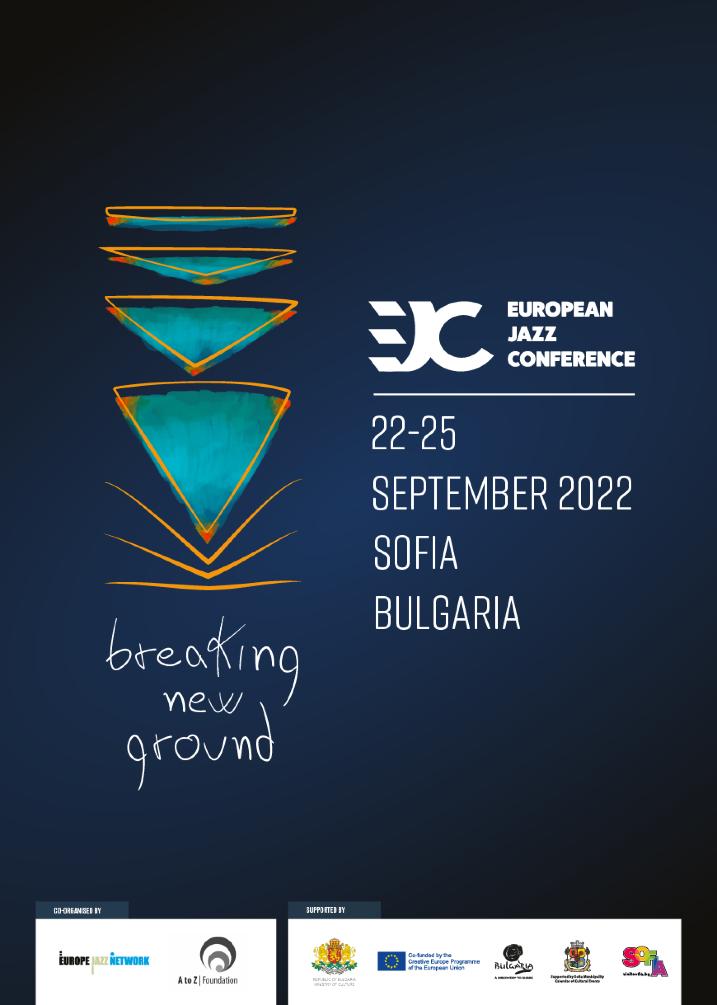































 Special tribute to John Cumming (1948 – 2020)
Special tribute to John Cumming (1948 – 2020)







